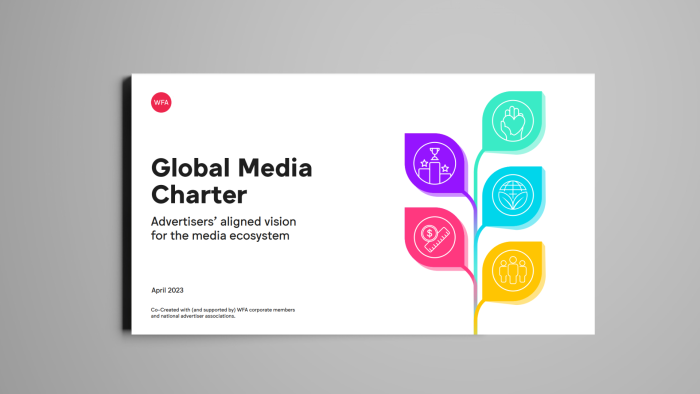Get analysis, insight & opinions from the world's top marketers.
Sign up to our newsletter.
Charter 3.0 builds on progress made in areas of brand safety and measurement and identifies five priority areas covering competition, accountability, responsibility, sustainability, and people.

WFA has published its third update to its Global Media Charter, building on the progress made in the areas of brand safety and measurement made possible by the previous version.
The Global Media Charter 3.0 takes a wider lens on the industry than its predecessor. As such, the document gives media leaders the strategic platform to ensure that their corporate responsibility agenda is represented in the media decisions made, platforms invested in and partners selected.
The new Charter identifies five key themes where focus is needed to unlock concerns and grow the ecosystem. These include Competition and Plurality, Measurement and Accountability, Responsibility and Society, Sustainability and Planet, People and Partners.
The revised Global Media Charter encourages media leaders to reflect on their role, business decisions, and their upstream and downstream impacts.
“The publication of the WFA Global Media Charter in 2018 was a seminal moment. It brought together the proposals of global advertisers for a safer and more transparent media ecosystem, and it made possible major advancements in brand safety and cross-media measurement. The updated Charter we are launching today, updates the recommendations of global advertisers in light of the areas where we are facing the most pressing challenges– competition, accountability, responsibility, sustainability, and people’, says Gerry D’Angelo, VP Global Media, P&G.
The Charter enables advertisers to speak with one voice to the industry and enables the WFA and its members to launch dedicated work programmes, designed to address the issues identified in the document. The Charter identifies opportunities for change and growth in each of these prioritised areas.
Plurality as the basis of innovation: The Charter reflects on market structures and the importance of a competitive market for innovation and growth in digital search, display, video and commerce. The document encourages advertisers to support a plurality of competitors in the pursuit of customer-focused innovation. This includes bringing media into wider supplier diversity initiatives and targets.
Climate and Sustainability: When it comes to sustainability, advertisers are looking for the whole ecosystem to work together to create efficiencies, by way of a global approach for carbon calculation models. This will allow brands to better balance their respective media planning and buying choices with a view to reducing CO2 emissions for the benefit of the climate and a green economy. The Charter sets out the need for uncommon collaboration to provide for ways to solve this challenge, and the WFA’s GARM is already beginning work with Ad Net Zero in this pursuit.
The previous Charter from 2018 has been responsible for catalysts in the advertising ecosystem including the creation of the Global Alliance for Responsible Media (GARM) and a cross-industry consortium (Halo) that was established to build client-centric and future facing measurement infrastructure.
Both of these initiatives have shown considerable success. GARM has been effective at creating new voluntary standards in brand safety. Halo has recently completed its first full release of open-source software code, now being used by exciting and pioneering pilots in the UK (Origin) and in the US (ANA).
“It’s hard to overstate how important the Media Charter has been for WFA. The 2018 Charter acknowledged that, perhaps more than ever before, the ad-funded internet was having a profound impact upon human behaviour, upon society, upon politics and while it’s not yet ‘mission accomplished’ on many of the issues flagged in the Media Charter 2.0, there has been progress. In 2023 clients are facing a new wave of challenges and concerns, including the climate challenge and the rise of AI so we need to kick start a new programme of governance with global industry leaders from the advertiser, agency, technology and media owner,” said Stephan Loerke, CEO, WFA.
Foundational issues need prioritization, with People a critical enabler: While responsibility and sustainability feature as large focus areas, global advertisers also seek to address essential issues which have been foundational concerns for some time. Ad fraud remains a considerable threat as do transparency issues with programmatic supply-chains. The growing talent crisis in media makes it harder for the industry to have a talent pipeline that is wide enough to address the growing complexity of media, whether at an agency or at an advertiser.
The new Charter has been developed by the WFA’s Media Board, which features global media leaders and association leaders from companies including ABInBev, ANA (US), BeamSuntory, Danone, Diageo, Goldman Sachs, Haleon, ISBA (UK), Jacobs Douwe Egberts, L’Oreal, Lipton Teas & Infusions, LVMH, Nestle, P&G, PepsiCo, Reckitt and Unilever. The Charter has also been backed by the whole membership.
One further change from 2018 is that in 2023 individual members of the Media Board will lead each of these five areas.
“We are actively fronting into the problems we see across the media landscape. But for a moment let’s talk about the positives too. Think right now of the shows you love and the journalism you trust to keep you informed. Often our brands and our advertising play a vital role in funding this powerful cultural content. In doing that we can ensure that people aren’t left under-represented or marginalised. And we don’t incentivise bad actors that are gaming the system or supporting bad ad experiences that are turning people off. That is why the Responsibility and Society section of the Media charter is so important” said Isabel Massey, VP Global Media & Content, Diageo, who (with Jerry Daykin, VP Global Media at BeamSuntory) will lead the Responsibility and Society areas.
For more information or questions, please contact us

